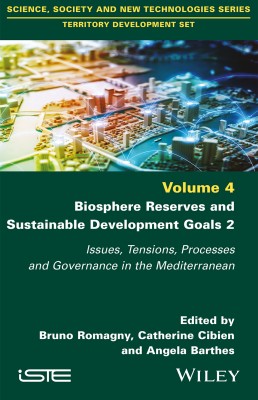
Since 1971, UNESCO’s Man and the Biosphere (MAB) Programme has embraced a number of principles that link the political, scientific and academic spheres.
Biosphere Reserves and Sustainable Development Goals 2 is a reminder of the fundamental issues involved in governance. The diversity and multiplicity of stakeholders, and the complexity of the interplay between them, as well as their organization, are decisive factors in the proper management of resources and territories.
The book also presents a number of case studies demonstrating that, between the strong development aspirations of their populations, the impact of human activities and the need to conserve their biological heritage, the biosphere reserves of the southern Mediterranean are facing major issues: agricultural pollution, forest fires, water use in a context of climate change, etc.
Part 1. Process, Governance and Climate Change Across the Mediterranean.
1. Biosphere Reserves in National Legislation and Public Policy, Catherine Cibien, Lahoucine Amzil, Joelle Barakat, Antonio Bontempi, Pierre Doumet and Maria Carmen Romera-Puga.
2. The Emergence and Evolution of Mediterranean Biosphere Reserves in France, Catherine Cibien.
3. Perspectives on Mediterranean Biosphere Reserves, Ken Reyna, Martí Boada and Mchich Derak.
4. From the Ecological Quality Status Evaluation to the Knowledge Transferability. A Cross-cutting Experience in Montseny Biosphere Reserve, Sònia Sànchez-Mateo, Antoni Mas-Ponce and Roser Maneja.
5. Do We Need to Choose Between Biodiversity, Industry and Tourism? A Metabolic Approach to Manage the Mediterranean Biosphere Reserve of Menorca, Alejandro Marcos-Valls.
6. The Jabal Moussa Biosphere Reserve (Lebanon): A Private Association Initiative, Pierre Doumet and Joelle Barakat.
7. Understandings of Administration and Challenges to Governance in the Arganeraie Biosphere Reserve (Morocco), Abdelaziz Afker.
8. Reconciling Conservation and Sustainable Development: The Example of the Arganeraie, Abdelaziz Afker and Saïd Boujrouf.
9. Patrimonialization and Challenges to Sustainable Development within the Arganeraie Biosphere Reserve, Wahiba Moubchir and Saïd Boujrouf.
10. The Oasis du Sud Marocain Biosphere Reserve: Challenges and Issues for the Durability of Water Resources, Lahcen Azougarh and Ahmed Mouhyiddine.
Part 2. Issues and Case Studies in the Southern Mediterranean.
11. Pesticide Residue in the Waters of the IBRM, Hind El Bouzaidi, Fatimazahra Hafiane, El Habib El Azzouzi and Mohammed Faekhaoui.
12. Forest Fires: Their Impact on the Sustainable Development of the IBRM, 12. Forest Fires: Their Impact on the Sustainable Development of the IBRM, Rachid Sammoudi, Abdelkader Chahlaoui, Nadia Machouri, Lahoucine Amzil, El Habib El Azzouzi, Reda Nacer, Kawtar Jaber and Maya Kouzaiha.
13. The Social and Solidarity Economy and Biodiversity in the Intercontinental Biosphere of the Mediterranean, Hicham Attouch, Soukaina Bouziani and Sonia Aderghal.
14. The Media Coverage of the Biosphere Reserve: Ambivalence Between the Protection of Nature and the Promotion of Territories. The Case of RBIM, Lahoucine Amzil, Yamina El Kirat El Allame and Faiza El Mejjad.
15. Mid-Atlas Cedar Forests and Climate Change, Driss Chahhou.
16. The Legacy and Future of Conservation in El Kala National Park (Algeria), Tarik Dahou.
17. Social Representations of Biospheres and Sustainable Local Development in Bou Hedma (Tunisia), Abdelkarim Brahmi.
18. Architecture and the Biosphere Environment in Pedagogy: Design Visions for Sustainable Dwelling Communities, Carla Aramouny.
Angela Barthes is a professor at the University of Aix-Marseille, France, and specializes in environmental education and rural development.
Catherine Cibien is director of the French committee of UNESCO’s Man and the Biosphere (MAB) Programme.
Bruno Romagny is an economist and director of research at the French National Research Institute for Sustainable Development (IRD – Institut de recherche pour le développement), Laboratoire population-environnement-développement (LPED), France.